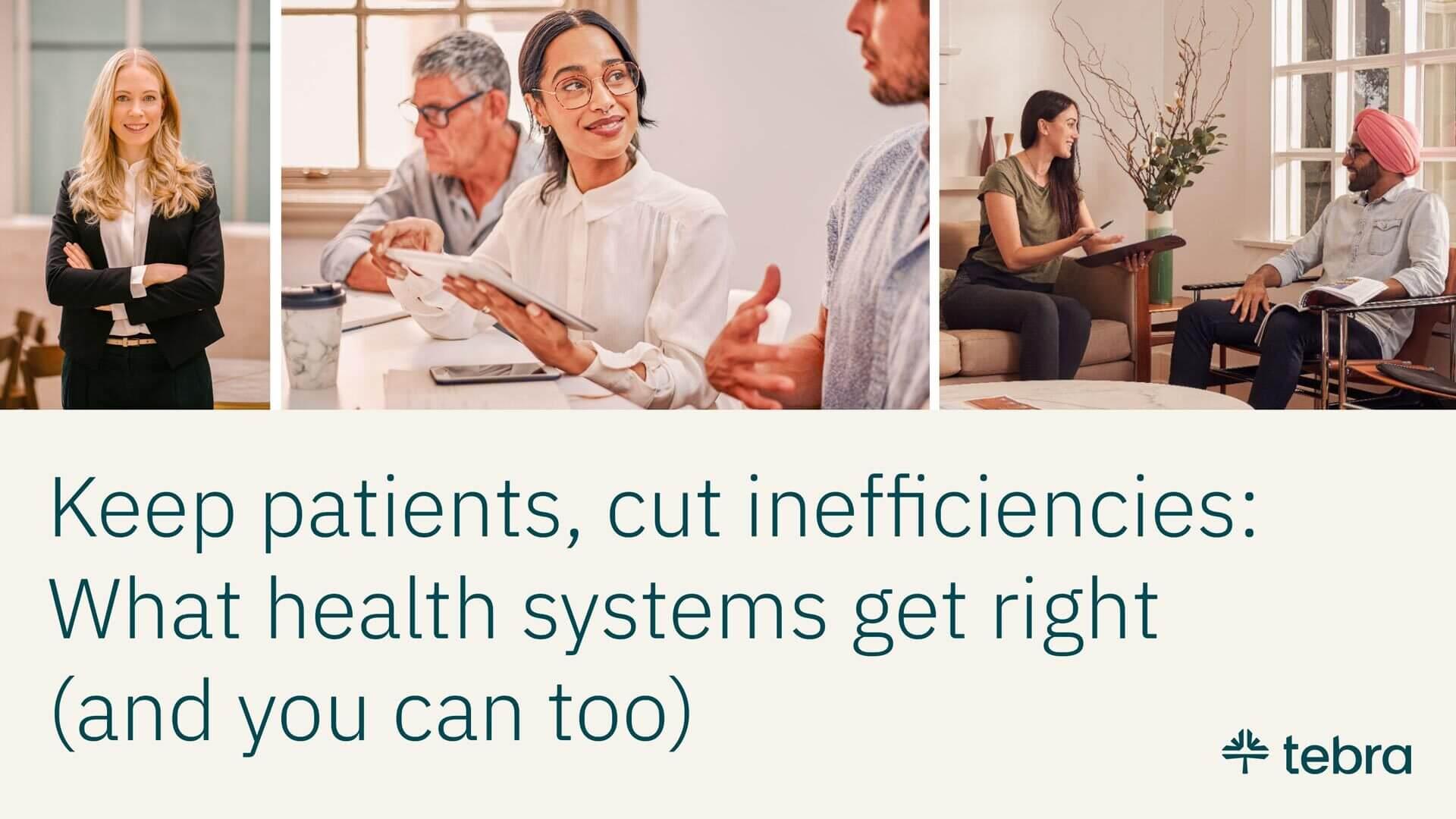Private medical practices are facing unprecedented financial and operational pressure. Between rising costs, payer reimbursement cuts, staffing challenges, and patient expectations, the need for efficiency has never been greater. But how do you streamline operations without compromising the quality of care?
For psychiatric nurse practitioner Naomi Myrick, who founded Cardinal Care Psychiatric Services in Virginia, the answer lies in technology. By embracing tools from integrated intake forms to automated appointment reminders, she has successfully grown her practice while maintaining the high-touch, personalized care that patients crave.
In a recent Tebra webinar, Naomi and Tebra healthcare marketing expert Miriam Datskovsky revealed practical strategies that real private practices leverage to stay competitive.
Here are the key learnings from the webinar:
- How operational efficiency directly enhances patient retention
- Which patient-centered digital tools deliver the biggest ROI
- Practical ways to make your practice more convenient and patient-friendly
- How to build patient loyalty while running a leaner, more profitable practice
Watch the webinar recording below to gain deeper insights into how to boost practice efficiency.
| For more insights on boosting your practice efficiency, check out Tebra’s resource library. |
Why efficiency is your greatest competitive advantage
Efficiency certainly is a competitive advantage, but it’s not all about saving money. Efficient practices directly impact both patient satisfaction and retention.
As Naomi emphasized in the webinar, operational hiccups aren’t just minor annoyances. They ripple out and affect patient trust, loyalty, and even treatment outcomes.
By using technology to reduce friction, practices can make patients feel supported from their very first interaction. Naomi’s thoughtful use of tools like telehealth, for example, has dramatically increased patients’ access to care.
"I have a lot of patients that I'm sure would have never sought behavioral healthcare if it had not been for telehealth," Naomi says.
Tebra’s all-in-one platform — combining labs, notes, billing, telehealth, and more — was foundational for streamlining her workflows from day one.
Patients now expect healthcare convenience similar to booking dinner reservations or online shopping. Big health systems have mastered this by investing heavily in technology that simplifies patient experiences, including:
- Online scheduling
- Digital payment options
- Secure patient portals
- Digital intake forms
- Easy lab result access
But private practices have one significant advantage: personalized, high-touch care. By adopting similar technology, smaller practices can match these digital conveniences while still offering the personalized care big systems often miss.
As Naomi puts it, small practices shouldn’t shy away from competing with larger systems, explaining that patients value the visibility and involvement of their provider — something independent practices can deliver more consistently than large systems.
Naomi describes her experience working at a health system: "I used to work at ... an excellent health system, one of the best in Virginia. But one thing that the patients said was that it's so big: ‘I don't really know anybody here. It took me 20 minutes to walk from where I parked to get here to where you are.’ A lot of patients don't love that idea. So even if it's maybe more efficient, there are a lot of other things about it that are not efficient from just a human being perspective."
| Love content like this? Join thousands of independent providers who receive our weekly newsletter with tips on running a more efficient, profitable practice. Sign up for the newsletter. |
6 patient-centered digital tools to streamline your practice
Naomi shares real-world examples from Cardinal Care Psych, demonstrating how Tebra's digital tools streamline operations and make your practice more patient-friendly.
1. Simplified online scheduling
Naomi's team minimizes administrative back-and-forth by using a custom “Welcome to Cardinal” form that collects key information upfront. This allows staff to return one focused call with everything needed to move forward.
"I try to make sure that our appointment request form includes everything that we need so that we can go ahead and take the next step," Naomi shares.
She also offers a waitlist to accommodate patients when some cancel.
"I say to patients all the time, it's important that you do call us a couple days before because someone else needs this spot," Naomi notes. "As much as you wanted this appointment today, there's somebody else that wants and needs this appointment. So if you can't be here, just let us know."
“I try to make sure that our appointment request form includes everything that we need so that we can go ahead and take the next step.”
2. Smart digital intake
Customizable digital forms allow staff at Cardinal Care Psych to gather information specific to their practice. Patients can also conveniently complete intake forms from any device without additional downloads. Data integrates directly into patient charts, eliminating manual transcription and reducing errors.
"We like to do things like having specific workflows with intake forms. We utilize the ability to create our own forms in Tebra. I've always loved that because if laws change in my particular state or my area, I can go in and edit the forms for those reasons," Naomi says.
3. A secure, convenient patient portal
Through Tebra's patient portal solution, patients can securely receive files and communicate easily with the practice (as long as it's non-emergent, Naomi notes). This reduces calls and enhances patient convenience and autonomy.
To manage expectations, Naomi educates patients that the portal is for non-urgent communication, not an instant messaging service. "When you send the message, don't expect a pretty immediate response," Naomi tells her patients.
She adds: "If you explain to patients [that] there will be maybe a 24- to 48-hour turnaround time to when we get back to you, then they're usually pretty okay with that … education, education, education is always the key and telling them how to access it."
4. Automated appointment reminders
Appointment reminders, that are available via text, phone, and email — has helped Cardinal Care Psych reduce no-shows and ultimately protect revenue. They've found that patients who reschedule tend to do so when the first appointment reminder gets sent — around 72 hours before appointments.
The reminders have also helped hold patients accountable to make their appointments, or pay no-show or late cancellations fees when necessary.
"The reality of it is, that's the only way we're going to keep our doors open," Naomi shares. "We can't have, you know, hours of time where people just don't show up. And I say to my staff all the time: this is also part of helping patients take responsibility for their own healthcare as well."
Consistent policies on no-shows, cancellations, and payments is important — but so is leaving room for compassionate flexibility. For example, Naomi has waived fees for patients in emergency situations or ones that never miss appointments and no-show once.
"You have to have some push pull. I am not hard and fast, where everyone gets a no show fee no matter what happened," Naomi says. She adds: "I think the patient relationship is more important than that fee that one time. So having the flexibility to work with your own policy is important too."
“Having the flexibility to work with your own policy is important too.”
5. Seamless online payments and billing automation
Automated SMS and email payment links speed up collections, making billing seamless for patients and consistent for practices. Most patients just want quick links to pay their invoices — not paper bills, Naomi notes.
"We've gotten to a place where we're very, very rarely, like, having to call patients and say, hey. You have this balance," Naomi says. "That rarely happens because patients are very good about just using the links."
6. AI-powered clinical notes
Tebra's AI medical scribe, AI Note Assist, has cut down Naomi's documentation process, generating usable notes in as fast as 90 seconds.
"Just to be able to just go in, see everything that I talked about there — and I wasn't clicking and clacking the whole time with the patient — and be able to actually look at them and pay attention is extremely helpful," Naomi shares.
Private practices can compete — and win
Naomi’s central message is clear: technology doesn’t replace the human touch; it enables it. By leveraging digital tools to handle administrative burdens, independent practices can focus on delivering the exceptional, personalized care that large systems struggle to replicate.
Download the slides
You can also download the webinar slides below for the top efficiency and patient care insights. Pair them with the full on-demand webinar to get an in-depth look at how top-performing practices are putting these strategies into action.

And if you're ready to learn more about Tebra's technology and how it can support your practice, take a product tour today.
You might also be interested in
- How to select an EHR/EMR: Learn how to select an EHR and what to consider when determining the best EHR medical software for your practice.
- Top 5 administrative tasks to automate in your practice: Say goodbye to tedious tasks and get time back in the day.
- Want to see an EMR/EHR in action? Book a free Tebra demo and experience how the right system can transform your practice.
- Current Version – Aug 27, 2025Written by: Jean LeeChanges: This article was updated to include the most relevant and up-to-date information available.
- Jul 21, 2025Written by: Jean LeeChanges: This article was updated to include the most relevant and up-to-date information available.






